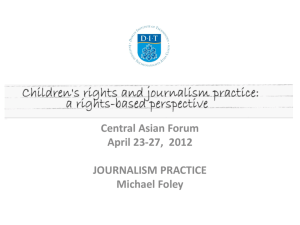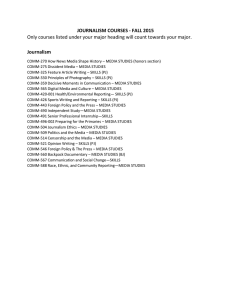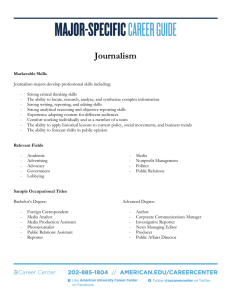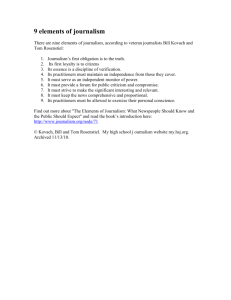Journalism Minor: Learning Goals:
advertisement
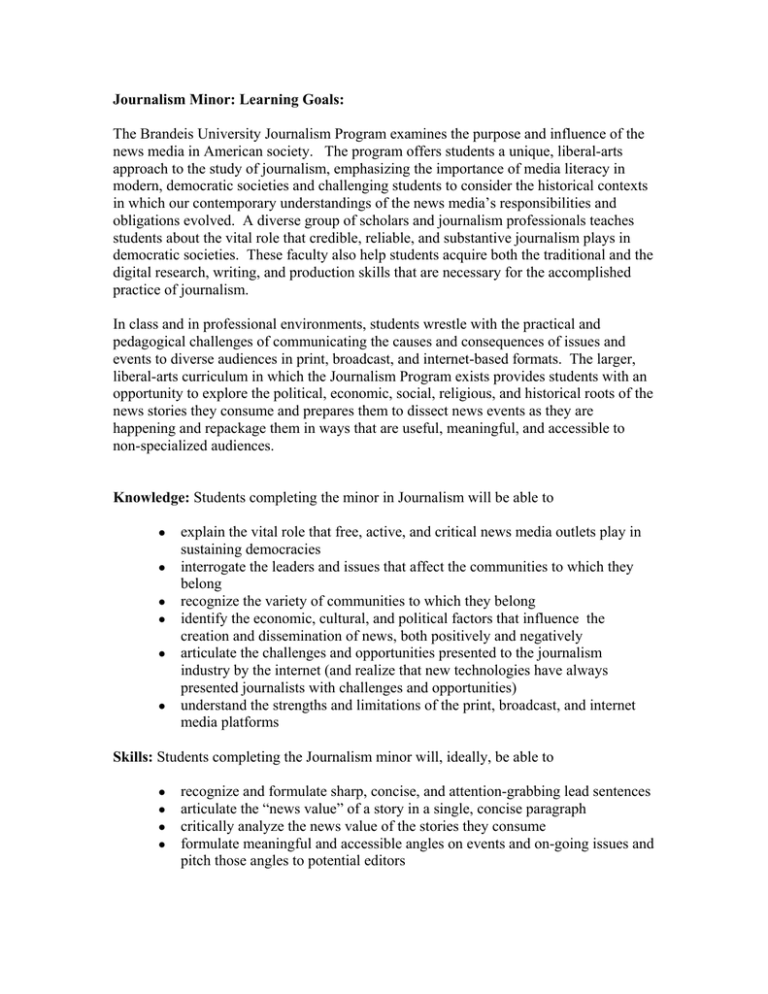
Journalism Minor: Learning Goals: The Brandeis University Journalism Program examines the purpose and influence of the news media in American society. The program offers students a unique, liberal-arts approach to the study of journalism, emphasizing the importance of media literacy in modern, democratic societies and challenging students to consider the historical contexts in which our contemporary understandings of the news media’s responsibilities and obligations evolved. A diverse group of scholars and journalism professionals teaches students about the vital role that credible, reliable, and substantive journalism plays in democratic societies. These faculty also help students acquire both the traditional and the digital research, writing, and production skills that are necessary for the accomplished practice of journalism. In class and in professional environments, students wrestle with the practical and pedagogical challenges of communicating the causes and consequences of issues and events to diverse audiences in print, broadcast, and internet-based formats. The larger, liberal-arts curriculum in which the Journalism Program exists provides students with an opportunity to explore the political, economic, social, religious, and historical roots of the news stories they consume and prepares them to dissect news events as they are happening and repackage them in ways that are useful, meaningful, and accessible to non-specialized audiences. Knowledge: Students completing the minor in Journalism will be able to ● ● ● ● ● ● explain the vital role that free, active, and critical news media outlets play in sustaining democracies interrogate the leaders and issues that affect the communities to which they belong recognize the variety of communities to which they belong identify the economic, cultural, and political factors that influence the creation and dissemination of news, both positively and negatively articulate the challenges and opportunities presented to the journalism industry by the internet (and realize that new technologies have always presented journalists with challenges and opportunities) understand the strengths and limitations of the print, broadcast, and internet media platforms Skills: Students completing the Journalism minor will, ideally, be able to ● ● ● ● recognize and formulate sharp, concise, and attention-grabbing lead sentences articulate the “news value” of a story in a single, concise paragraph critically analyze the news value of the stories they consume formulate meaningful and accessible angles on events and on-going issues and pitch those angles to potential editors ● identify relevant interview subjects and conduct concise, directed, and fruitful interviews ● recognize quotes and sound-bites that advance and substantiate a story angle and incorporate those quotes and sound-bites seamlessly into the body of a story ● adjust their writing styles to meet the needs of daily and long-form journalism, particularly with regard to the differences between news and feature stories ● internalize the Code of Ethics that has been formulated by the Society of Professional Journalists and recognize violations of that code when they occur Social Justice Statement: We certainly believe that anyone graduating from Brandeis University’s Journalism Program has the potential to identify, explore, challenge, and explain issues with the same clarity and insight that characterize the dossiers of awardwinning journalists. Our goal for the program, however, goes beyond just creating journalists. We seek to create a cadre of news producers and consumers who will demand that journalists fulfill their obligations to society – and insist that society provide journalists the tools and the freedom they need to meet those obligations. Journalists are obliged to be disinterested but engaged public witnesses who focus light on the hidden and forgotten corners of society and engender a sense of community ownership among the citizens who make up their audiences. In doing this, they are obliged to avoid hyperbole, speculation, and gossip. We hope that some of our graduates will become journalists who meet these obligations. We hope that all of our graduates will become citizens who work to ensure that these obligations are met – and are able to be met – by journalists. After Brandeis: Roughly half of the students minoring in Journalism choose either to pursue careers in the field immediately after graduation, or else to attend graduate school at places like Columbia, Syracuse, and Northwestern, where they pursue Master’s degrees in Journalism or journalism-related subjects. The remaining Journalism minors tend to pursue careers in Education, Law, Public Relations, and Advertising – fields where professionals are expected to dissect and understand complicated arguments, make clear and concise written and oral statements about those arguments, and take complex ideas or issues and package them in ways that make them accessible and interesting to broad, mainstream audiences.
